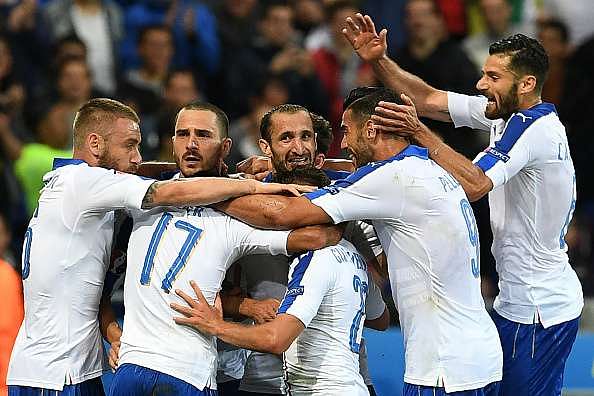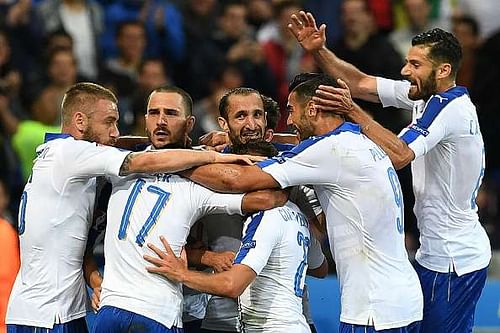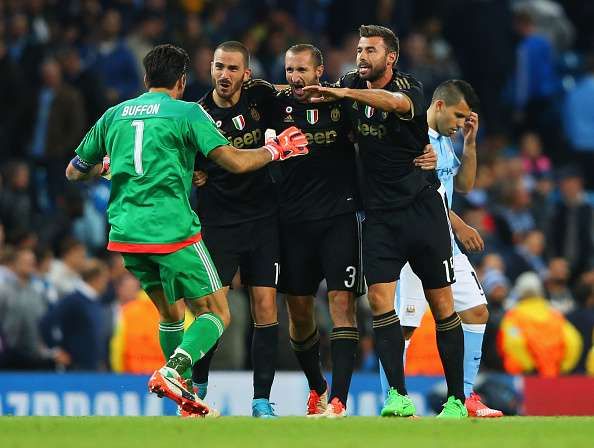
Euro 2016: Italy have perfected the art of closing out games

The opening round of fixtures at UEFA Euro 2016 are done with, and one could be forgiven for critiquing the level of excitement thrown up so far. Teams have been cautious and edged out 1-0 victories more often than not, making for efficient football on the pitch but not the most eye-watering of displays. So, when the Italians, renowned for defensive astuteness and lacking the attacking armoury that the Azzurri has had in the past, rocked up to face Belgium, many expected more of the same drab football. What followed was something extraordinary...
Conte set his side up in a 3-5-2 formation, operating with the Juventus trio of Bonucci, Barzagli and Chiellini at the back in front of a 38-year-old Gianluigi Buffon. Belgium had all the qualities needed in the frontline, with Romelu Lukaku an ideal candidate to gobble up chances created by the dynamic pair of Eden Hazard and Kevin De Bruyne. As the match wore on, though, and following Emmanuel Giaccherini's opener, it grew apparent that the Red Devils were no more than a team of individuals that struggled to unify on the night.
As for Italy? Everybody in a blue shirt put in a solid shift, with the defence and attack squeezing together to limit play to the flanks by restricting any pools of space through the centre. Antonio Conte, the soon-to-be Chelsea manager, saw his side work as a team and frustrate the Belgians. Divock Origi got little time to make an impact at the top of the tree after replacing the woeful Lukaku and Belgium could simply not find the net. This lead to an inevitable counter from Italy at the death, as Graziano Pellé sealed the fate of Marc Wilmot's men. It was the best team performance I've seen this tournament, as a telepathic understanding combined with top tactics masked any weaknesses in the side and it proved Italy are among the best at seeing out matches.
No Team Soaks Up Pressure Better

To close out games effectively, a solid defence is the key. England conceded late to Russia not only due to the bizarre quality of the goal but also due to the lack of experience and overall ability at the back.
With Chiellini, Bonucci and Barzagli able to suffocate a lone striker (an option most sides go with in the modern era) and the fact that Buffon has arguably the safest pair of gloves in the game, teams can try for as long as they want to break down the Azzurri defence but unless they navigate their way in behind the trio at pace, it's unlikely they'll find a breakthrough quickly. As a result, teams tire and are susceptible to the counter attack which Italy are masters at with wing-backs Candreva and Darmian at their disposal. The tactic of three at the back works so well because they all play for the same club and have experience in this set-up with the Old Lady also, while none of them are particularly short of pace when retreating from their high line.
Tactical Fouls
Some may argue that intending to foul an opponent to buy time is essentially cheating but the Italians executed such a tactic so perfectly last night, I'd say it falls under the bracket of good game management.
Conte's clan received four yellow cards last night, two of which Martin Atkinson awarded to Italian defenders. The game grew more nervy for the eventual winners as time progressed, with Belgium committing more men forward and gradually working their way into the game. How can you stop this momentum? Hack down a key player just before they drive into the final third; this broke the fluidity of the Belgium's play, allowing Italy time to regroup and because it was carried out in an area where there were defenders still in front of the forwards, a red card was out of the question, barring a particularly rash challenge.
As the tournament progresses, Italy will be among many squads who will see their contingent fatigue and so matches will feel longer and it will be harder to cling on to 1-0 cushions late on. By ensuring they prevent key opposing players from surging far forwards with the odd clip of the boot, they provide themselves with an opportunity to catch their breath and simultaneously unsettle the other team.
Versatile Virtuosi
When teams desire to see out a match and hold onto their lead, it's of the utmost importance that every individual can hold their own in the defensive half of the pitch. Other sides often suffer because their forward line is too lethargic to track back in the dying stages of the game.
In Conte's set-up, Marco Parolo and Daniele De Rossi, both defensive-minded midfielders, are able to shift back when under the cosh, along with the wing-backs to essentially form a 7-man defence which can limit space available for the opposition to use to snatch a victory.
Even Eder, Pellè, Zaza and Immobile have the abilities to load the box at the last minute to heighten the Italians' aerial presence, making for a team that is able to fully focus on their defensive duties when required at the business end of a match.
This is the perfect example of a whole team playing their part in winning a football match.
In the Blood
Ultimately this is not a trait championed merely by the current Azzurri crop; it's something that lays at the root of the side's DNA. Italy have made the final of the European Championships on three occasions and the semi-finals five times, outlining their innate ability to survive in a major tournament. This sentiment is bolstered by their performance at the 2006 World Cup, where they triumphed over the French, despite Les Bleus' peppering of the Italian goal. The Italians managed to defend the 1-1 scoreline right through to the end of 120 minutes, encapsulating yet again their ability to see off results, even when they're under pressure.
While some teams are well-known for monopolising possession (Spain) or an infamously poor penalty record (Netherlands), the Italians' claim to fame is that they know how to frustrate opponents at the death and are the masters at the back, the likes of legends Franco Baresi and Paolo Maldini revolutionised this aspect of the game in particular.